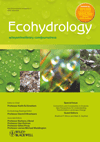
Ecohydrology
Scope & Guideline
Exploring the Nexus of Water and Ecosystems
Introduction
Aims and Scopes
- Integration of Hydrology and Ecology:
Research that elucidates the relationships between hydrological processes and ecological dynamics, highlighting how water availability influences biodiversity and ecosystem functions. - Impact of Climate Change on Water-Ecosystem Interactions:
Studies examining how climate change alters hydrological regimes and subsequently impacts ecosystems, particularly in vulnerable regions. - Water Resource Management Strategies:
Development and evaluation of strategies for sustainable water resource management that incorporate ecological considerations and aim to balance human needs with ecosystem health. - Use of Advanced Modeling Techniques:
Application of sophisticated modeling approaches to simulate ecohydrological processes and predict future scenarios under various environmental conditions. - Field Studies and Empirical Data Collection:
Conducting extensive field studies to gather empirical data on hydrological and ecological parameters, contributing to a deeper understanding of ecosystem dynamics.
Trending and Emerging
- Microplastic Pollution and Aquatic Ecosystems:
An increasing number of studies are focusing on the detection and impact of microplastics in aquatic environments, underscoring the need to understand anthropogenic influences on ecosystems. - Adaptive Management in Response to Climate Variability:
Research is trending towards adaptive management strategies that respond to climate variability, emphasizing resilience and sustainability in water resource management. - Hydrological Connectivity and Ecosystem Functioning:
There is a rising interest in studying hydrological connectivity and its role in maintaining ecosystem functions, particularly in riverine and wetland systems. - Use of Remote Sensing and Advanced Technologies:
The integration of remote sensing technologies and machine learning approaches to monitor and model ecohydrological processes is becoming increasingly prevalent. - Biodiversity Responses to Hydrological Changes:
An emerging theme involves investigating how changes in hydrological regimes affect biodiversity, with a focus on the implications for ecosystem services.
Declining or Waning
- Traditional Water Quality Assessments:
There appears to be a waning emphasis on conventional water quality assessments, as the field moves towards more integrative approaches that consider ecological impacts alongside chemical analyses. - Simple Hydrological Models:
The use of basic hydrological models without ecological integration is declining, with a growing preference for complex models that account for ecological interactions and feedback mechanisms. - Case Studies Focused Solely on Local Contexts:
Research that focuses exclusively on localized case studies without broader ecological implications or connections to global environmental change is becoming less prominent. - Single Species Studies:
There is a noticeable decrease in studies concentrating solely on single species impacts without considering broader ecological networks or community dynamics.
Similar Journals

Earth Interactions
Connecting Disciplines, Unraveling Earth’s MysteriesEarth Interactions is a prominent journal that serves as a critical platform for interdisciplinary research in the field of Earth and Planetary Sciences. Published by the American Meteorological Society, this journal has established itself as a key resource for scholars, researchers, and professionals dedicated to understanding Earth's complex systems and their interactions. With an impressive Q1 ranking in the category of Earth and Planetary Sciences for 2023, it reflects a commitment to high-quality scholarship and impactful contributions to the field. The journal, with its dedicated coverage from 2004 to 2024, encompasses a wide array of topics, providing comprehensive insights into geological, atmospheric, and environmental phenomena. Although it operates under a non-open access model, its significance is underscored by its placement in the top percentile of Scopus rankings (Rank #89/195), making it an exciting resource for those pursuing advanced studies and applications related to Earth's systems.

LHB-Hydroscience Journal
Elevating Hydroscience Research for Global ImpactLHB-Hydroscience Journal, published by Routledge Journals, Taylor & Francis Ltd in the United Kingdom, stands as a significant platform in the realm of Water Science and Technology. Since its inception in 2021, this open-access journal has been dedicated to disseminating high-quality research that addresses the critical challenges faced in hydroscience, aiming particularly at fostering innovative solutions for sustainable water management. With an impressive E-ISSN of 2767-8490, it offers researchers, professionals, and students the opportunity to access cutting-edge findings without any paywall, thereby promoting wider dissemination and engagement within the academic community. Although it currently holds a Q4 quartile ranking and ranks #208 out of 261 in the Environmental Science category, the journal aspires to elevate its scholarly impact through rigorous peer-reviewed articles that contribute to the field from 2021 to 2024. As recognition of its growing significance, LHB-Hydroscience Journal invites contributions that explore the multidimensional aspects of water science—from interdisciplinary methodologies to real-world applications—catering to an audience eager to push the boundaries of current knowledge.
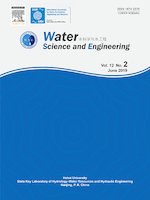
Water Science and Engineering
Fostering Open Access to Groundbreaking Water StudiesWater Science and Engineering, published by ELSEVIER, is a premier open access journal that has been disseminating vital research in the realms of civil and structural engineering as well as ocean engineering since 2008. With its ISSN 1674-2370 and E-ISSN 2405-8106, this journal plays a crucial role in advancing knowledge and innovation within the sector, evidenced by its impressive rankings in Scopus—holding the 15th position out of 105 in Ocean Engineering and 76th out of 379 in Civil and Structural Engineering, placing it in the 86th and 80th percentiles, respectively. Attaining a Q1 classification in both categories for 2023 highlights its importance and influence in the academic and professional communities. The journal addresses a broad spectrum of topics integral to water sciences, offering significant insights for researchers, professionals, and students alike. With a convergence period spanning from 2010 to 2024, it continues to explore contemporary issues and advancements, providing a pivotal platform for the dissemination of research. The journal is accessible to a global audience, reaffirming its commitment to fostering open access and enhancing accessibility to vital scientific literature.
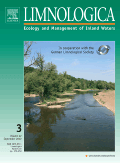
LIMNOLOGICA
Connecting Researchers to the Heart of LimnologyLIMNOLOGICA is a prestigious academic journal dedicated to the field of aquatic sciences, published by Elsevier GmbH, a leading global publisher known for its commitment to disseminating high-quality research. With an ISSN of 0075-9511 and an E-ISSN of 1873-5851, the journal has established itself as a vital source of scholarly articles, reviews, and case studies since its inception in 1974. Operating from its base in Munich, Germany, LIMNOLOGICA provides a forum for researchers and professionals to explore contemporary issues in limnology, ensuring important contributions to the understanding of freshwater ecosystems. Recognized in the 2023 rankings, the journal boasts a respectable Q2 quartile in Aquatic Science, ranking #98 out of 247 in Scopus, placing it in the 60th percentile among its peers. While currently not an open-access journal, it continues to attract a wide readership by providing insights into ecological processes, conservation strategies, and the impacts of anthropogenic changes on freshwater environments. This makes LIMNOLOGICA an essential resource for anyone engaged in aquatic research, conservation efforts, and environmental policy development.

Hydrology
Leading the way in hydrological research and innovation.Hydrology, published by MDPI, is a prominent open-access journal dedicated to advancing the field of hydrological science. Since its establishment in 2014, the journal has garnered a reputation for excellence, reflected in its classification within the Q2 quartile for 2023 across multiple categories including Earth-Surface Processes, Oceanography, Water Science and Technology, and Waste Management and Disposal. Based in Switzerland, Hydrology provides a vital platform for scholars and practitioners to disseminate research findings, promote innovative methodologies, and foster discussions on current trends affecting water resources and management globally. The journal is easily accessible online and aims to significantly contribute to the understanding of hydrological processes, offering insights that are pivotal for addressing contemporary environmental challenges. With Scopus rankings showcasing its growing influence, Hydrology is a crucial resource for researchers, students, and professionals committed to water science and sustainable practices.

JOURNAL OF THE AMERICAN WATER RESOURCES ASSOCIATION
Leading the charge in water resource research since 1967.The JOURNAL OF THE AMERICAN WATER RESOURCES ASSOCIATION, published by Wiley, is a premier platform dedicated to advancing the field of water resource management and research. With an ISSN of 1093-474X and an impressive Q1 ranking in multiple categories, including Earth-Surface Processes, Ecology, and Water Science and Technology, this journal serves as a vital resource for professionals, researchers, and students alike. Established in 1967 and set to converge through 2024, it has consistently published cutting-edge research that influences policy and practice in water resource management. The journal's open access option enhances its reach, ensuring that critical findings are accessible to a wider audience. The Scopus rankings further underscore its impact, placing it in the top quartile within its fields, highlighting its importance in shaping scholarly discourse. As a significant contributor to the understanding and management of freshwater systems, the journal offers a crucial means for sharing insights and fostering collaboration in the vital realm of water resources.
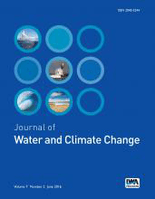
Journal of Water and Climate Change
Championing Interdisciplinary Research for a Water-Secure FutureJournal of Water and Climate Change is a premier open-access journal published by IWA Publishing, dedicated to advancing the understanding of the interplay between water resources and climate change. With an ISSN of 2040-2244 and an E-ISSN of 2408-9354, this journal has established itself as a crucial platform for interdisciplinary research, publishing high-quality articles that address the challenges posed by climate variability on water systems globally. Since achieving open access status in 2021, the journal has fostered wider dissemination of knowledge among its audience, featuring works that span pivotal topics in Atmospheric Science, Global and Planetary Change, and Water Management. Notably ranked within the top quartiles in several relevant categories as of 2023, it occupies a vital position in the academic community, offering insights that are essential for policymakers, environmental scientists, and researchers striving to create sustainable solutions for water and climate challenges. Its commitment to excellence is reflected in its strong Scopus rankings, standing at the 66th percentile in Water Science and Technology and 65th percentile in Management, Monitoring, Policy, and Law. Located in the United Kingdom, this journal not only serves as a repository of cutting-edge research from 2010 to 2024 but also engages a diverse readership passionate about promoting sustainable water management practices.
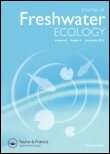
JOURNAL OF FRESHWATER ECOLOGY
Innovating research for sustainable freshwater futures.JOURNAL OF FRESHWATER ECOLOGY, published by Taylor & Francis Inc, is an esteemed source of research dedicated to advancing the understanding of freshwater ecosystems. Established in 1981, this Open Access journal has provided a platform for innovative studies and groundbreaking articles relevant to the fields of Aquatic Science and Ecology. With its HIndex reflecting a commitment to quality scholarship, the journal is currently classified in the Q3 category for both Aquatic Science and Ecology, Evolution, Behavior and Systematics, indicating its respectable impact within these disciplines. The journal ranks within the 45th percentile in Ecology and the 41st percentile in Aquatic Science on Scopus, highlighting its relevance to a global audience of researchers and practitioners. By facilitating unrestricted access to research findings since 2017, JOURNAL OF FRESHWATER ECOLOGY aims to enrich our understanding of freshwater systems and their conservation, making it an essential resource for those invested in ecological research and environmental sustainability.
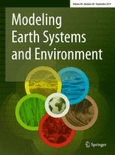
Modeling Earth Systems and Environment
Bridging theory and application for a sustainable future.Modeling Earth Systems and Environment is a premier interdisciplinary journal published by Springer Heidelberg, dedicated to advancing the understanding and modeling of Earth's systems and environmental processes. Since its inception in 2015, this journal has established itself as a vital resource within the academic community, attaining a Q1 ranking in Agricultural and Biological Sciences and Q2 rankings in Computers in Earth Sciences, Environmental Science, and Statistics, reflecting its high impact and relevance across multiple disciplines. Featuring rigorous peer-reviewed research, Modeling Earth Systems and Environment aims to bridge the gap between theory and practical application, fostering collaboration among researchers, professionals, and students alike. With access options that prioritize the dissemination of knowledge, this journal is crucial for those seeking to contribute to the fields of environmental modeling and systems science, encouraging innovations that address contemporary environmental challenges.

Earth Systems and Environment
Transforming Insights into Action for Earth’s Well-beingEarth Systems and Environment, published by Springer International Publishing AG, is a leading peer-reviewed journal dedicated to the multidisciplinary study of natural and anthropogenic processes that shape the Earth's systems. With an impressive impact factor and consistently ranked in the Q1 category across various fields, including Computers in Earth Sciences, Economic Geology, and Environmental Science, it stands as a premier platform for researchers and professionals seeking to address pressing environmental challenges. The journal covers a wide spectrum of topics, from geology to global change, and emphasizes innovative methodologies and interdisciplinary approaches to understand and manage Earth systems. As an essential resource for scholars and practitioners, Earth Systems and Environment commits to excellence and facilitates open dialogue on critical issues affecting our planet.